News
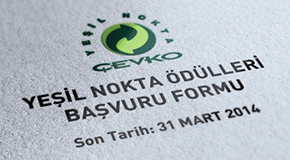 Yeşil Nokta Ödülleri Sahiplerini Arıyor
Yeşil Nokta Ödülleri Sahiplerini Arıyor
Yeşil Nokta markasını kullanan şirketler arasında sürdürülebilir hayata katkılarıyla öne çıkanlar, ÇEVKO Vakfı tarafından ilk defa düzenlenen yarışma ile ödüllendirilecek.
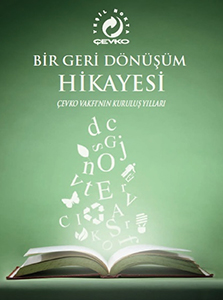 22
yıldır pek çok başarılı organizasyona imza atan ÇEVKO Vakfı'nın fikir
olarak ortaya çıkışını, kuruluş çalışmalarını, resmen tescilini ve
kuruluşundan sonraki ilk yıllarını, yani 1990 yılı son çeyreği ile 1993
yılı arasındaki döneminin vakfımızın ilk Yönetim Kurulu Başkanı Sayın
Salih Zeki ÖÇAL tarafından kaleme alındığı " Bir Geri Dönüşüm Hikâyesi"
çıktı.
22
yıldır pek çok başarılı organizasyona imza atan ÇEVKO Vakfı'nın fikir
olarak ortaya çıkışını, kuruluş çalışmalarını, resmen tescilini ve
kuruluşundan sonraki ilk yıllarını, yani 1990 yılı son çeyreği ile 1993
yılı arasındaki döneminin vakfımızın ilk Yönetim Kurulu Başkanı Sayın
Salih Zeki ÖÇAL tarafından kaleme alındığı " Bir Geri Dönüşüm Hikâyesi"
çıktı.
"Bir Geri Dönüşüm Hikayesi'ni okumak için tıklayınız.
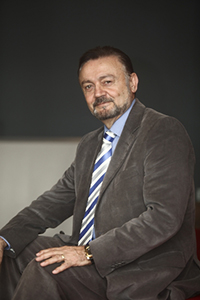 İÇECEK AMBALAJLARINDA AĞIRLIK AZALTMA ÇALIŞMALARI VE ÇEVREYE ETKİSİ
İÇECEK AMBALAJLARINDA AĞIRLIK AZALTMA ÇALIŞMALARI VE ÇEVREYE ETKİSİ
1-Giriş
İlk kez 19. yüzyılın sonlarına doğru İstanbul'da evlerin bodrumlarında, eski banyo küvetlerinde hazırlanarak, keçe filtrelerden geçirilip süzülen ve kahve cezveleri ile şişelere doldurulup satılan gazlı içeceklerin üretimi, 1950'li yıllardan başlayarak ‘bodrum katlarından'' çıkıp, ‘'gazoz hanelere ‘'taşınmıştır. Ama Ülkemizdeki meşrubat üretimindeki asıl gelişme 1960'lı yılların başında uluslar arası iki firmanın (Pepsi-Coca Cola) üretime başlaması ile olmuştur.
İklim Değişikliği: Sıfır emisyona ulaşmak OECD Genel Sekreteri Mr. Angel Gurría'nın İklim Değişikliğ
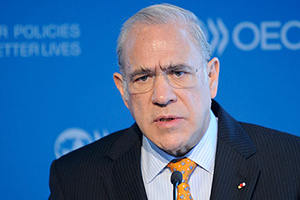 Bugün
buraya, iklim değişikliği konusunun üstesinden gelmek ve bunu başarmak
için gerekli politika araçlarına ulaşmak için gerekli kuvvetli isteğimiz
üzerine konuşmak için geldim. 2015 sonlarına doğru Paris'te
gerçekleştirilecek olan Konferansa yaklaşırken, liderlerimiz iki temel
çelişki ile karşı karşıya bulunuyor: iklim değişikliği risklerini
kontrol altına alabilmek veya bu tehditi sınırlayabilme yeteneklerinin
ellerinden kayıp gittiğine şahit olmak.
Bugün
buraya, iklim değişikliği konusunun üstesinden gelmek ve bunu başarmak
için gerekli politika araçlarına ulaşmak için gerekli kuvvetli isteğimiz
üzerine konuşmak için geldim. 2015 sonlarına doğru Paris'te
gerçekleştirilecek olan Konferansa yaklaşırken, liderlerimiz iki temel
çelişki ile karşı karşıya bulunuyor: iklim değişikliği risklerini
kontrol altına alabilmek veya bu tehditi sınırlayabilme yeteneklerinin
ellerinden kayıp gittiğine şahit olmak.
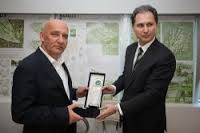 Vakfımız Genel Sekreteri Mete İmer, Kartal Belediye Başkanı Op. Dr. Altınok Öz'ü başkanlık makamında ziyaret ederek çevreye olan duyarlılığı ve çevreye yönelik çalışmalara verdiği destekten dolayı plaket takdim
etti. ÇEVKO Vakfı Genel Sekreteri Mete İmer, yürüttükleri pek çok
projede olduğu gibi bu yıl da "Ambalaj Atıkları Geri Kazanım Projesi"
kapsamında Kartal Belediyesi'ni daima yanlarında gördüklerini, çevreye
olan duyarlılığı ve çevreyle ilgili yapılan projelere verdikleri destek
ve katkılarından dolayı teşekkürlerini iletti.
Vakfımız Genel Sekreteri Mete İmer, Kartal Belediye Başkanı Op. Dr. Altınok Öz'ü başkanlık makamında ziyaret ederek çevreye olan duyarlılığı ve çevreye yönelik çalışmalara verdiği destekten dolayı plaket takdim
etti. ÇEVKO Vakfı Genel Sekreteri Mete İmer, yürüttükleri pek çok
projede olduğu gibi bu yıl da "Ambalaj Atıkları Geri Kazanım Projesi"
kapsamında Kartal Belediyesi'ni daima yanlarında gördüklerini, çevreye
olan duyarlılığı ve çevreyle ilgili yapılan projelere verdikleri destek
ve katkılarından dolayı teşekkürlerini iletti.
 Çevresel
ve sosyal sorumluluk yaklaşımını ürün ve hizmetlerine entegre ederek
insanların her gün daha iyi ve daha sürdürülebilir bir yaşam sürmesi
için çalışan P&G, 15'inci Global Sürdürülebilirlik Raporu'nu
yayınladı. Çamaşır makinelerinde yapılan yıkamalarda soğuk su kullanımı
alışkanlığının artırılması, karbon salımının azaltılması, ihtiyaç
sahiplerinin sağlık ve hijyen ihtiyaçlarının karşılanması konusundaki
2020 hedeflerine büyük oranda ulaşan P&G, çalışanlarının gönüllülük
projelerine dahil edilmesi ve ürün inovasyonu konusunda da başarılı
uygulamaları hayata geçirdi.
Çevresel
ve sosyal sorumluluk yaklaşımını ürün ve hizmetlerine entegre ederek
insanların her gün daha iyi ve daha sürdürülebilir bir yaşam sürmesi
için çalışan P&G, 15'inci Global Sürdürülebilirlik Raporu'nu
yayınladı. Çamaşır makinelerinde yapılan yıkamalarda soğuk su kullanımı
alışkanlığının artırılması, karbon salımının azaltılması, ihtiyaç
sahiplerinin sağlık ve hijyen ihtiyaçlarının karşılanması konusundaki
2020 hedeflerine büyük oranda ulaşan P&G, çalışanlarının gönüllülük
projelerine dahil edilmesi ve ürün inovasyonu konusunda da başarılı
uygulamaları hayata geçirdi.
3. Yeşil Binalar Zirvesi 20-21 Şubat Tarihlerinde İstanbul Lütfi Kırdar Uluslararası Kongre ve Sergi
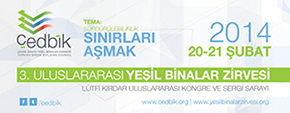 Çevre
Dostu Yeşil Binalar Derneği (ÇEDBİK) tarafından yapı sektörünün yeşil
dönüşümüne liderlik etmek amacıyla bu yıl üçüncü kez düzenlenecek olan
"Uluslararası Yeşil Binalar Zirvesi", 20-21 Şubat 2014 tarihlerinde
İstanbul Lütfi Kırdar Uluslararası Kongre ve Sergi Sarayı'nda
gerçekleşecektir.
Çevre
Dostu Yeşil Binalar Derneği (ÇEDBİK) tarafından yapı sektörünün yeşil
dönüşümüne liderlik etmek amacıyla bu yıl üçüncü kez düzenlenecek olan
"Uluslararası Yeşil Binalar Zirvesi", 20-21 Şubat 2014 tarihlerinde
İstanbul Lütfi Kırdar Uluslararası Kongre ve Sergi Sarayı'nda
gerçekleşecektir.
İFAT 2014 Türkiye Katılım Organizasyonu İTO Tarafından Gerçekleştirilyor.
T.C. Ekonomi Bakanlığı'nın verdiği görev ve yetkiye istinaden, dünya'nın en büyük atık, geri dönüşüm, arıtma, atık su ve çevre teknolojileri fuarı "IFAT 2014" Türkiye Milli Katılım organizasyonu, 5-9 Mayıs 2014 tarihleri arasında İstanbul Ticaret Odası tarafından gerçekleştirilecektir.
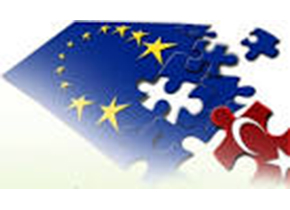 Avrupa
Birliği Genişleme Genel Müdürlüğü, Türkiye'nin AB'ye uyum sürecinde son
bir yıllık ilerlemesini değerlendirdiği raporu 16.10.2013 tarihinde
açıkladı.
Avrupa
Birliği Genişleme Genel Müdürlüğü, Türkiye'nin AB'ye uyum sürecinde son
bir yıllık ilerlemesini değerlendirdiği raporu 16.10.2013 tarihinde
açıkladı.


